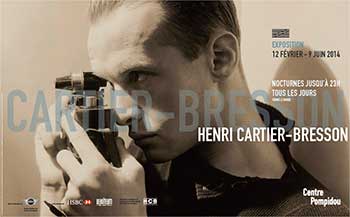 One of the world’s most influential photographers is featured with a retrospective at Paris’ Centre Georges Pompidou. Henri Cartier-Bresson, (August 22, 1908 – August 3, 2004) considered by many to be the father of photojournalism, blended a remarkable sense of design with the ability to capture the significance of an instant… the decisive moment.
One of the world’s most influential photographers is featured with a retrospective at Paris’ Centre Georges Pompidou. Henri Cartier-Bresson, (August 22, 1908 – August 3, 2004) considered by many to be the father of photojournalism, blended a remarkable sense of design with the ability to capture the significance of an instant… the decisive moment.
This major retrospective including over five hundred photographs, drawings, paintings, videos and documents is organized both thematically and chronologically around three major periods: the early years (1926-1935) marked by his travels and contact with the Surrealists. A second section is devoted to his political commitment when he returned from the US in 1936 until he set off for New York again in 1946. Finally a look at his photojournalism and the creation of Magnum (1947) ending in the seventies.
Cartier-Bresson gave up photojournalism at the beginning of the ’70s (“Because I had said everything that I had to say”) mostly devoting himself to drawing. “It is contemplation and meditation. It gives me an inner peace and it’s not important whether people like it or not.” He was born into a bourgeois family near Paris in 1908 and originally studied painting. By his early 20s, he was hanging out with the Surrealists, being invited to Marie-Louise Bousquet’s famous salon and befriending the likes of Max Jacob and Marcel Duchamp. He was also taken to the home of Gertrude Stein, who took one disparaging look at his painting and advised him to go into his father’s business.
Instead, he became a photographer in the 1930s after seeing a picture by Martin Munkácsi of three African boys running into the sea. “I was startled. I said to myself,‘My God, you can do that with a camera.'” After the war, he co-founded the Magnum photo agency. He was the first western photographer admitted into the Soviet Union after Stalin’s death. He was also present at Gandhi’s funeral and witnessed the first civil rights sit-ins in Alabama.
Although there has been an excellent traveling retrospective of Bresson’s photographs in the States recently (first showing in 2010 at MOMA), this exhibition promises to be special in that it draws on the thousands of photographs and documents housed at the Fondation Henri Cartier-Bresson, located in Paris. It is the first French retrospective of Bresson’s work since his death.
Henri Cartier-Bresson (to June 9, 2014) Centre Georges Pompidou, 3 rue Beaubourg 75004 PARIS.

